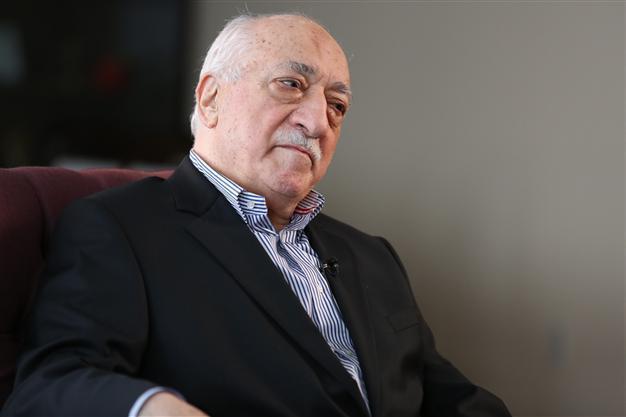Gülen faces investigation as an espionage probe launched at TİB
ANKARA

US-based Islamic scholar Fethullah Gülen. CİHAN photo
Hours after the announcement of legal action against U.S.-based Islamic cleric Fethullah Gülen on charges of attempting to overthrow the government, an espionage probe has been launched in Ankara into claims that sensitive data from the Telecommunications Directorate (TİB) was leaked to foreign countries via satellite links.
The fierce rivalry between the Justice and Development Party (AKP) government and the Gülen community acquired a new dimension after an investigation against Gülen was launched by the Ankara Chief Prosecutor’s Office on charges of “attempting to annul the government of the Republic of Turkey; or attempting to partially or entirely block the government from performing its duties,” according to private broadcaster CNN Türk.
Those who are accused of staging, planning or supporting military coups d’état are commonly charged with this crime.
The investigation was disclosed by Culture and Tourism Minister Ömer Çelik on April 30 during a live interview with news channel NTV, a day after Prime Minister Recep Tayyip Erdoğan said he would ask the United States to extradite Gülen, who he accuses of plotting to topple him and undermine Turkey through graft accusations and secret wiretaps.
“The investigation’s result is important for the survival of Turkey. This should be investigated as a problem of national security,” Çelik was quoted as saying by several news portals.
A prosecutor’s office that is in charge of “Crimes committed against the Constitution” will conduct the investigation, according to reports.
In addition to “attempting to annul the government of the Republic of Turkey; or attempting to partially or entirely block the government from performing its duties,” the investigation is also based on the crime of “founding and directing an organization,” the same reports said.
“There are serious allegations that concern espionage activities as well. We have observed leakages of the state’s most confidential meetings and efforts to create a nucleus within the state,” Çelik said.
The leak to which Çelik refers was about the release of a voice recording of a key Syria meeting at the Foreign Ministry with the participation of Foreign Minister Ahmet Davutoğlu, intelligence chief Hakan Fidan and other senior civilian and military officials. An Ankara prosecutor has launched a separate investigation into the leak, but government officials put the blame on what they call the “parallel structure,” meaning the Gülen community, although speculation is continuing as to who actually taped the meeting, during which officials discussed possible false-flag operations to drag Turkey into the war in Syria.
'Espionage leak through foreign satellites'
Hours after the announcement of legal actions against Gülen, the Gölbaşı Prosecutor’s Office in Ankara announced that an espionage probe had been launched into claims that information from the TİB had been leaked to foreign countries.
The prosecutor's office cited claims published in the media, alleging that the whole database of the TİB, including the digital memory and logs before 2012, was deleted by unknown individuals, after they were copied and leaked via foreign satellites to an unknown location with satellite dishes at the TİB building, which were then left inoperable.
"An investigation has been launched due to the reports claiming that important and sensitive information kept by the state and the TİB were leaked to foreign countries through foreign satellites before being deleted ultimately for the purpose of espionage for foreign countries," the prosecutor's office said in a written statement.
The government and the Gülen community have been engaged in a harsh struggle following the launch of a massive corruption and graft operation against government officials on Dec. 17, 2013. Phone conversations of Erdoğan and other governmental officials were posted on social media on a nearly daily basis on the eve of local polls on March 30, with the government accusing Gülenists in the police and judiciary of conducting a plot.
On the day news broke about the sensational probes, the National Security Council (MGK) convened under the leadership of President Abdullah Gül. The Gülen community was discussed at a MGK meeting in January in which it took up the issue of some organizations and structures which pose serious threats to national security – the first indirect reference to the community at the body.
Gov’t to demand Gülen’s extraditionWith the launch of legal action against Gülen, the government could consider filing an appeal to the U.S. for the extradition of Gülen to Turkey, in line with the 1979 Treaty on Extradition and Mutual Assistance in Criminal Matters. The treaty obligates contracting parties to surrender to each other all persons who are being “prosecuted for or have been charged with an offense or are sought by the other party for the enforcement of a judicially pronounced penalty for an offense committed within the territory of the requesting party.”
If the requested party considers the offense for which extradition is requested to be of a political character then it may refuse to extradite the requested person. However, any offense committed or attempted against a head of state or a head of government or against a member of their families shall not be deemed to be an offense of a political character, the treaty reads.
Gülen has lived in self-imposed exile in Pennsylvania since 1999, when secularist authorities raised accusations of Islamist activity against him. He was acquitted of all charges in 2008.
